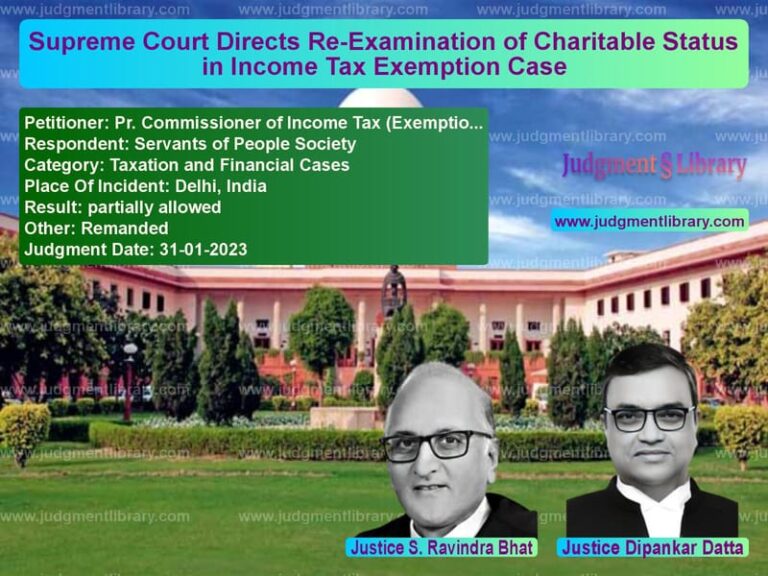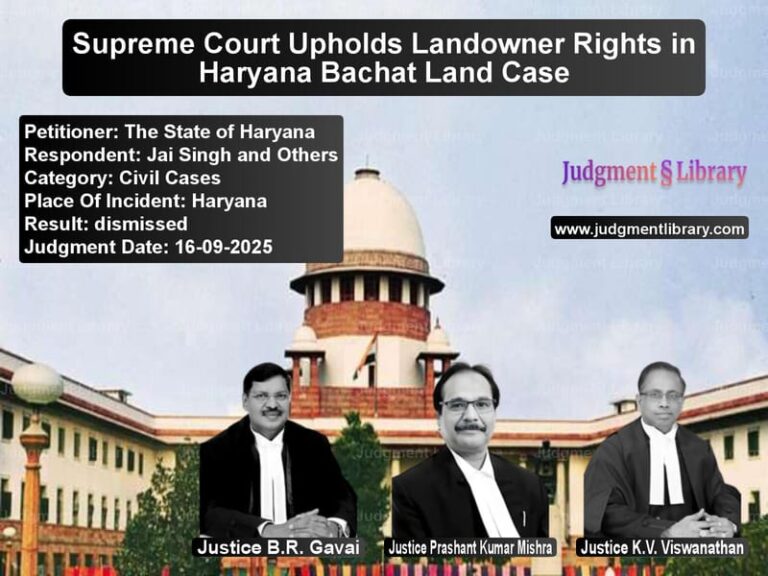Supreme Court Rules on Land Acquisition: DDA vs. Shakuntla Devi Case
The Supreme Court of India recently ruled in the case of Delhi Development Authority (DDA) vs. Shakuntla Devi and Others, addressing whether land acquisition proceedings had lapsed under Section 24(2) of the Right to Fair Compensation and Transparency in Land Acquisition, Rehabilitation and Resettlement Act, 2013. The case focused on whether the failure to pay compensation or take possession of land led to the lapsing of the acquisition.
Background of the Case
The case stemmed from a writ petition filed by the landowners, who argued that the acquisition initiated under the Land Acquisition Act, 1894 should be deemed lapsed under Section 24(2) of the 2013 Act. The Delhi High Court ruled in their favor, stating that the proceedings had lapsed due to the non-payment of compensation. The DDA appealed against this decision in the Supreme Court.
Read also: https://judgmentlibrary.com/land-acquisition-case-supreme-court-overturns-high-courts-lapse-ruling/
The dispute centered around land acquisition in Khasra No. 759(4-16), where the original writ petitioner held a 1/4th share. The Land Acquisition Collector (LAC) asserted that possession was taken and documented in a panchnama on December 31, 2013. However, the High Court overlooked this and ruled in favor of the landowners.
Arguments by the Appellant (DDA)
- The DDA argued that the High Court’s decision was unsustainable in light of the Supreme Court’s ruling in Indore Development Authority vs. Manoharlal (2020).
- They contended that since possession was taken, the proceedings did not lapse, even if compensation was not paid.
- The High Court’s ruling was contrary to the settled principle that land acquisition does not lapse if either possession is taken or compensation is deposited.
Arguments by the Respondents (Landowners)
- The landowners contended that they never received compensation and that mere documentation of possession was insufficient.
- They argued that the provisions of Section 24(2) of the 2013 Act mandated that both conditions (compensation payment and possession) be fulfilled.
- Their position was that since they remained in possession, the acquisition should be deemed void.
Supreme Court’s Observations
- “The word ‘or’ in Section 24(2) must be read as ‘nor’ or as ‘and’, meaning that lapse occurs only if neither possession has been taken nor compensation has been paid.”
- “The High Court’s reasoning was flawed as it failed to consider the possession records.”
- “Once possession is taken, the land vests with the government, and Section 24(2) does not apply.”
Final Judgment
- The Supreme Court set aside the High Court’s judgment and upheld the validity of the land acquisition proceedings.
- The Court ruled that since possession was taken, the acquisition had not lapsed.
- The landowners’ plea for lapse of acquisition was rejected.
Legal Precedents Considered
- Indore Development Authority vs. Manoharlal (2020): Established that land acquisition does not lapse if either possession has been taken or compensation has been deposited.
- Pune Municipal Corporation vs. Harakchand Misirimal Solanki (2014): Previously held that compensation must be paid directly to the landowner, but was later overruled.
- Shiv Kumar vs. Union of India (2019): Confirmed that acquisition does not lapse if possession is taken or compensation is deposited.
Implications of the Judgment
- The ruling prevents landowners from invalidating long-standing acquisitions by citing non-payment of compensation.
- It ensures that government projects relying on land acquisition are not hindered by legal technicalities.
- The decision strengthens legal certainty in land acquisition matters, making it clear that once possession is taken, the land belongs to the government.
- Authorities can now rely on possession records to defend against lapse claims.
Conclusion
The Supreme Court’s ruling confirms that land acquisition does not lapse merely due to non-payment of compensation if possession has been taken. This decision brings clarity to the interpretation of Section 24(2) and strengthens legal certainty in land disputes. The ruling will have a significant impact on future land acquisition cases across India.
Petitioner Name: Delhi Development Authority.Respondent Name: Shakuntla Devi and Others.Judgment By: Justice M.R. Shah, Justice C.T. Ravikumar.Place Of Incident: Delhi.Judgment Date: 20-01-2023.
Don’t miss out on the full details! Download the complete judgment in PDF format below and gain valuable insights instantly!
Download Judgment: delhi-development-au-vs-shakuntla-devi-and-o-supreme-court-of-india-judgment-dated-20-01-2023.pdf
Directly Download Judgment: Directly download this Judgment
See all petitions in Property Disputes
See all petitions in Damages and Compensation
See all petitions in Judgment by Mukeshkumar Rasikbhai Shah
See all petitions in Judgment by C.T. Ravikumar
See all petitions in allowed
See all petitions in Quashed
See all petitions in supreme court of India judgments January 2023
See all petitions in 2023 judgments
See all posts in Civil Cases Category
See all allowed petitions in Civil Cases Category
See all Dismissed petitions in Civil Cases Category
See all partially allowed petitions in Civil Cases Category







